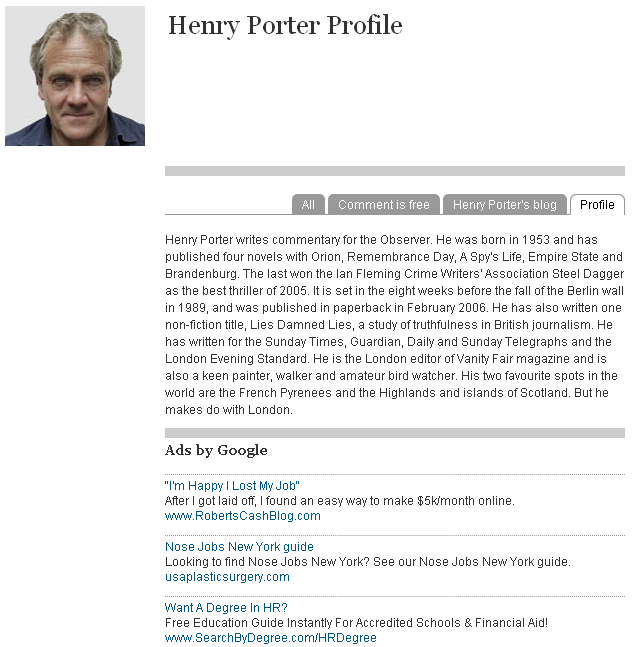Leave it to the English--famous for their superior fluency in the language that bears their name--to reach unparalleled heights of hysteria in the war of words being waged against Google. The Guardian's Henry Porter claims that "Google is just an amoral menace: The ever-growing empire produces nothing but seems determined to control everything."
Porter declares that Google is the world's "most prominent WWM," his acronym for the "worldwide monopolies that sweep all before them with exuberant contempt for people's rights, their property and the past."
Google is in the final analysis a parasite that creates nothing, merely offering little aggregation, lists and the ordering of information generated by people who have invested their capital, skill and time. On the back of the labour of others it makes vast advertising revenues - in the final quarter of last year its revenues were $5.7bn, and it currently sits on a cash pile of $8.6bn.
Let's review Google's 2008 Annual Report. Of Google's 2008 Revenue ($21.78 billion), two-thirds ($14.41 billion) came from advertising on Google sites and just under one-third ($6.71 billion) came from advertising on Google Content Network (GCN) web sites (made up of publishers that sell their ad space to advertisers through Google AdSense). On this revenue, Google made a net profit of $4.2 billion after taxes. To put these numbers in context, Microsoft (Google's closest peer) earned three times ($60.42 billion) Google's revenue and produced 4.21 times ($17.68 billion) Google's profit. Google's revenue was just 0.1528% of 2008 U.S. GDP and its net income, 0.0294%.
So what does Google actually create with all that revenue? The answer is free content and services.
First, Google cross-subsidizes dozens of its own free services--starting with its search engine but also including email, a free browser, YouTube, a word processing suite, IM, maps, news, and much more.
Second, as the world's leading ad network, Google supports a significant percentage of the free content and services offered by others. In 2008, Google paid out $5.28 billion (24.22% of revenue) to GCN publishers--significantly more than the $4.2 billion Google earned in net income (19.3% of revenue).
At a time when politicians think nothing of spending hundreds of billions of dollars at a time and even the word "trillion" no longer shocks our pre-hyperinflationary ears, $5.28 billion may not seem like much. Indeed, it's just 30% of NASA's 2008 budget. But, spread across the "Long Tail," these dollars go a lot farther than even NASA's deep space probes: They fund hundreds of thousands of GCN websites, ranging from traditional newspapers like the New York Times to social networks to countless community sites.
Wired Magazine editor-in-chief Chris Anderson has brilliantly described the "Long Tail" and explained how advertising plays a critical role in funding "Free!" But nothing puts the Long Tail of ad-supported Internet content into human terms like the Interactive Advertising Bureau's video, "I Am the Long Tail:"
Check out IAB's gallery of small publishers, too. Or, to get a sense of the amazing variety of the "Long Tail" of web services, check out Go2Web20.net's famously overwhelming display of the logos for roughly 2726 apps "Web 2.0" applications. While it can be harder to support web apps with advertising revenue than content sites, recent estimates indicate that over a third of all web applications rely on advertising.
But Porter says not a word about Google's role as an economic fountainhead of online innovation and creativity. He simply dismisses Google as "delinquent and sociopathic." One might dismiss Porter as just another crank in the "Long Tail of Googlephobia," but his 188-year-old newspaper, The Guardian, is among the world's most respected. With a circulation 1/3 that of the New York Times and 1/2 that of The Washington Post (in a nation five times smaller than the U.S.), The Guardian is serious when it claims to be "the world's leading liberal voice." For those unimpressed by any newspaper, note that Porter's rant topped Techmeme today.
So rants like Porter's are being heard--no matter how unfounded they are.
In terms of both credibility and exaggeration, Porter's piece deserves a place at the very head of the "Long Tail" of hyperbole published by "serious" publications like The Guardian. While Porter doesn't actually play the Reductio ad Hitlerum card (just about the only card he has left), his attack is, for sheer unfairness, strongly reminiscent of Whittaker Chambers' infamous 1957 review of Ayn Rand's novel Atlas Shrugged in the normally-dignified National Review. The conservative Chambers, horrified by Rand's atheism, equated her radical individualism to Hitler's Holocaust, declaring: "From almost any page of Atlas Shrugged, a voice can be heard, from painful necessity, commanding: 'To a gas chamber -- go!'"
Will anyone be surprised when papers like The Guardian give space to a modern-day Chambers to rant about how Google is the Third Reich reborn--or how Google is The Matrix made real? Every rant like Porter's makes it just a little harder to have a serious, rational conversation about Google and its impact on society--both good and ill. If that's the kind of "journalism" Porter thinks Google is killing, it's not worth saving. The only thing more ironic than Porter's attack on Google for undermining serious journalism--something of which he himself seems incapable--is the juxtaposition of Google's ads with Porter's official profile on The Guardian:
